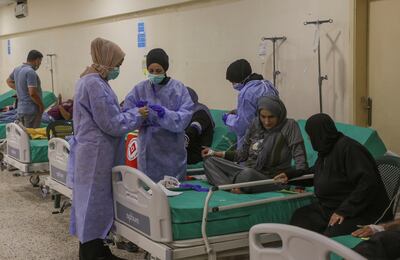Cholera is rapidly spreading across Lebanon, the World Health Organisation has warned, with the country’s health ministry reporting more than 1,700 confirmed or suspected cases since the outbreak began in early October.
The WHO said there was a shortage of health workers and supplies to tackle the outbreak, Lebanon’s first in three decades.
Lebanon’s Health Ministry said on Tuesday that there had been 17 deaths so far, with 93 hospital beds occupied by those confirmed to have the disease or suspected cases.
A devastating economic crisis and ageing infrastructure in Lebanon is only hindering efforts to tackle the spread of cholera.
“Cholera is deadly but it is also preventable through vaccines and access to safe water and sanitation. It can be easily treated with timely oral rehydration or antibiotics for more severe cases,” says Dr Abdinasir Abubakar, WHO Representative in Lebanon.
“The situation in Lebanon is fragile as the country already struggles to fight other crises — compounded by prolonged political and economic deterioration.”
While cases are concentrated in the northern regions bordering Syria, cholera has “rapidly spread” across Lebanon, the WHO said.
Lab-confirmed cases have now been reported in all eight governorates and in 18 out of 26 districts. The cholera strain found in Lebanon is similar to the one in neighbouring Syria, which is itself grappling with a major outbreak of the diarrheal infection.
Cholera is typically caused by ingesting contaminated water or food. The informal settlements where cholera was first reported in Lebanon suffer from extremely poor sanitation, making it an ideal place for the infection to spread.
Lebanese authorities have said most cases were among Syrian refugees, of whom there are more than a million in the country.

Health authorities are seeking to secure 600,000 doses of cholera vaccines for those who are most vulnerable, particularly frontline workers, prisoners and refugees.
The WHO said the “prolonged difficult economic conditions and limited access to clean water and proper sanitation” in Lebanon were only exacerbating the situation.
“There is still an opportunity to limit the spread and impact of the outbreak by intensifying response interventions, including improving water and sanitation quality. We also need to raise awareness on how to prevent cholera infection so that we can lift the pressure off hospitals,” Dr Abubakar said.
“The best way to prevent a cholera outbreak is to ensure people have access to clean water and appropriate sanitation and hygiene. In the long term, we need to scale up global vaccine availability as part of a holistic strategy to prevent and stop cholera outbreaks worldwide.”










